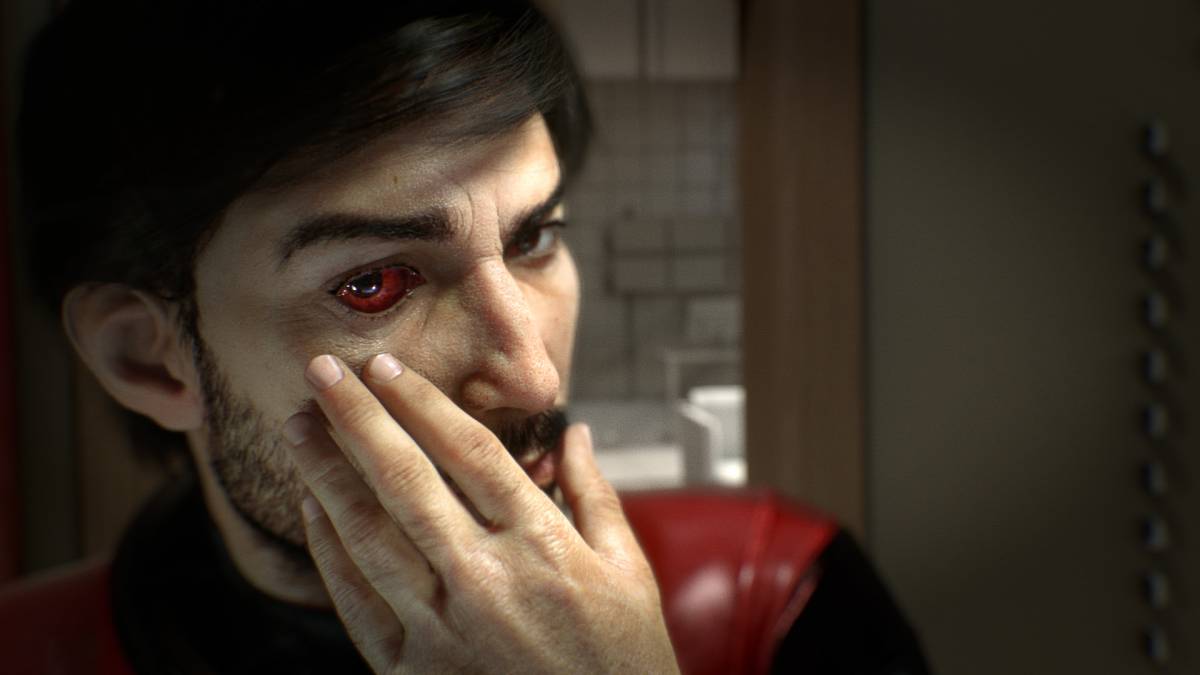It’s probably not a secret that I’m fairly excited about the upcoming Prey reboot. Despite some criticisms I have leveled, I do love the Dishonored series for being one of the best franchises at creating an immersive world filled with interconnected gameplay systems, just begging to be experimented with. The player is given total freedom to all but break the game, with only their Chaos level to act as a temper for those who want the good ending.
Now, Arkane is bringing their world-building and sandbox gameplay expertise away from whalepunk sorcery and into the realm of alternate history science-fiction. Prey’s timeline is one where JFK was never assassinated, and the space race was an even bigger deal. An encounter with a collective of aliens known as the Typhon resulted in the creation of the orbital station now known as Talos 1 to contain and study them.
Much like the System Shock/Bioshock and Alien series this has drawn comparisons to, things inevitably go fatally wrong. Protagonist Morgan Yu finds his/herself one of the few (if not the last) survivors aboard the station as the telepathic Typhon run amok all over the station. Forced to improvise and adapt to survive by using whatever tools, resources and superhuman abilities are available, it is here that Prey establishes its core premise and gameplay.
Here’s a few things that could make that gameplay and Yu’s struggle all the more enjoyable.
1. No normal human enemies
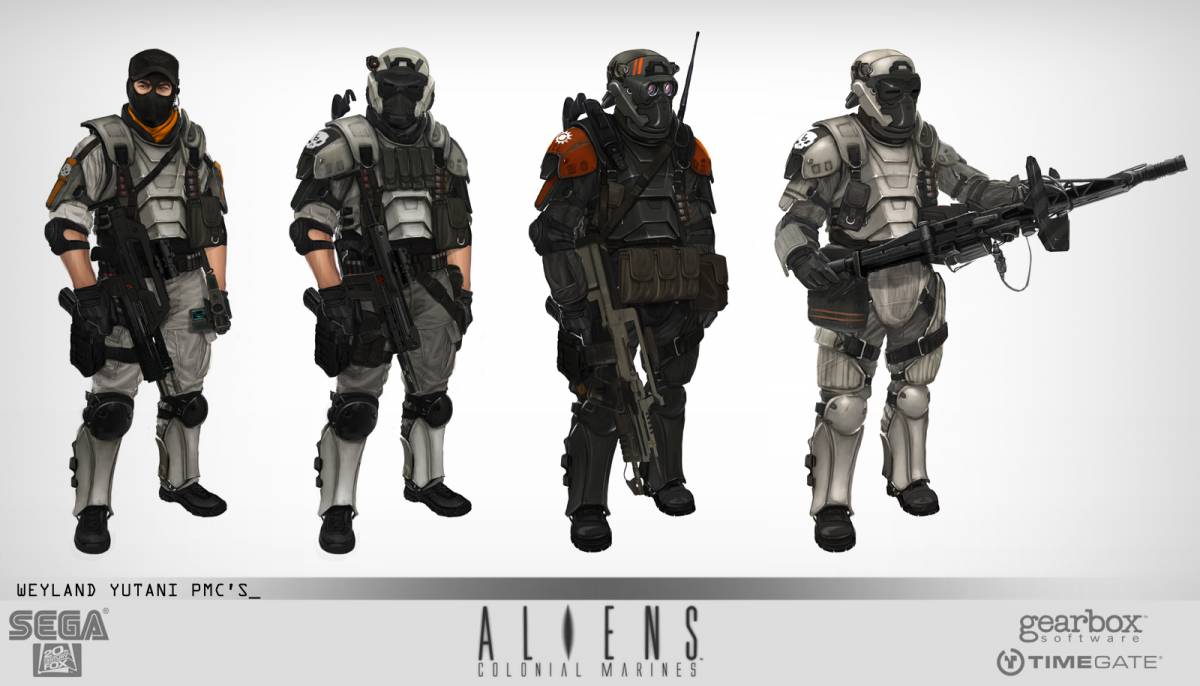
Gameplay previews have already shown us that there exists an enemy called the Telepath which, appropriately, is capable of controlling the actions of other creatures; namely, your fellow crew members. Referred to as “mind-slaves,” these unfortunate souls retain enough of their faculties to be aware of their actions and warn you away, but can do nothing to stop their fulfillment of their master’s commands.
The encounters as described and seen so far are atmospheric, creepy and totally in keeping with the sci-fi horror vibe the game seems to be going for. This is a great addition to the bestiary, and I look forward to trying to puzzle my way around these encounters.
What I don’t want is for, say, a ‘rescue’ team to show up and, stop if me if this sounds familiar, try to kill me because I “know too much” or “they’re actually rival corporate mercenaries/bandits/assholes” or what have you. Aliens: Colonial Marines was not a good game anyway, but it was made even worse by the shoehorning in of Weyland-Yutani mercenaries that turned significant portions of the game into terrible, tension-wrecking shootouts with helmeted generic bad guys instead of claustrophobic struggles against the iconic xenomorph hordes. The much better Alien: Isolation also featured human enemies and, while they were much better integrated into the experience and could mostly be avoided or lured into the alien’s claws, confronting them was still my least favorite part of that pants-shittingly terrifying game.
The variety of Typhon species, combined with Arkane’s superb track record of level design and the sheer number of tools and options available to the player, should be more than enough to make Prey a compelling, tense adventure about a man/woman versus an entire race of cosmic horrors. Leave the goons and assault rifles out please.
2. generous saving
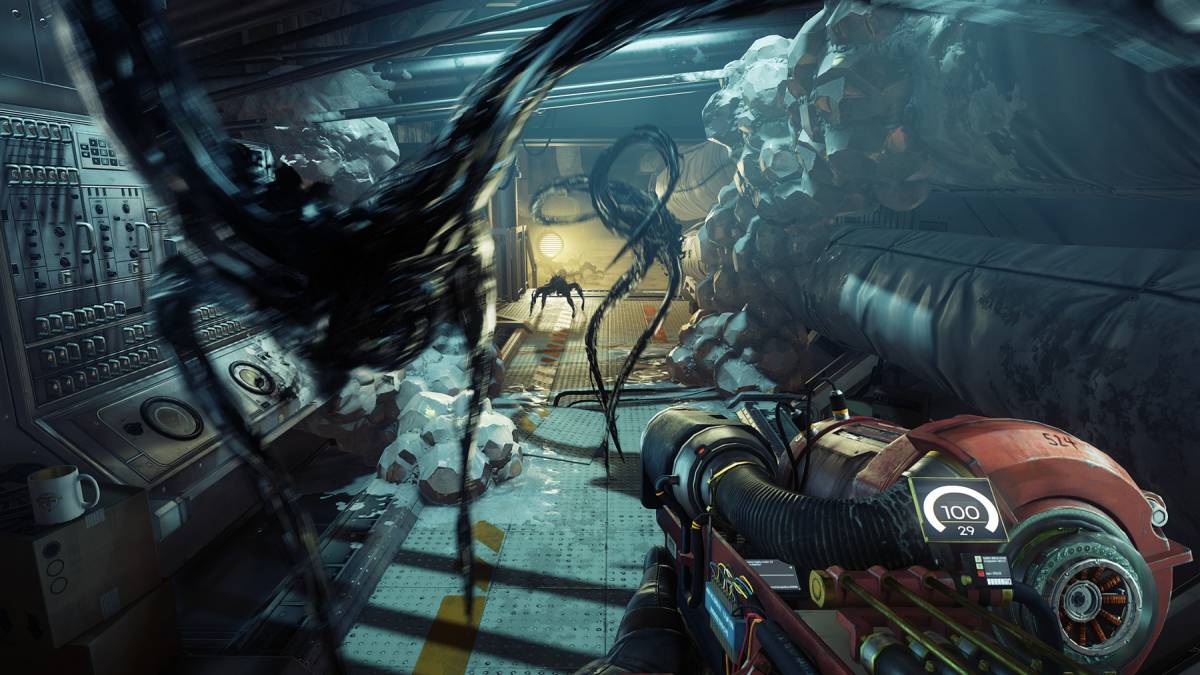
I’ve been banging on about tension and horror here quite a bit, but that’s only half of what Prey is offering. It is clear that the game is leaning away from resource-starved games like the older Resident Evils and Alien: Isolation, and is more in-keeping with Bioshock and Arkane’s own Dishonored in that it seems to want to keep the player decently stocked with things to play around with. It definitely does not seem like the kind of game to make the player feel weak and defenseless; more like outnumbered and on borrowed time.
With that in mind, the game’s array of weapons, gadgets and abilities seems to be pointing towards an environment and gameplay loop of experimentation. Again, like Dishonored, Arkane is constructing an interlocking series of systems (physics, enemy behavior, environmental interaction and story telling) and giving us the tools and abilities to go wild with these systems, marrying or manipulating them in new and interesting ways that I’m sure will quickly astound the dev team soon after release.
A checkpoint or save-station system just isn’t going to cut it for that type of gameplay. Dishonored 2 added a quicksave system in additon to a save-anywhere functionality, both on PC and consoles, and the result was hours and hours of playing the same sections of levels messing with guards, practicing combos of powers and weapons and just generally having the time of my life with the game.
I believe the enjoyment of the gameplay and potential for experimentation must win out over any minor hiccups this might cause in terms of undermining the tension or pacing of the story and horror elements. Saving is under the player’s control in this situation, and they should be able to use it to tailor their experience accordingly – save scum and experiment, or live with your actions and learn as you go.
3. don’t punish combat
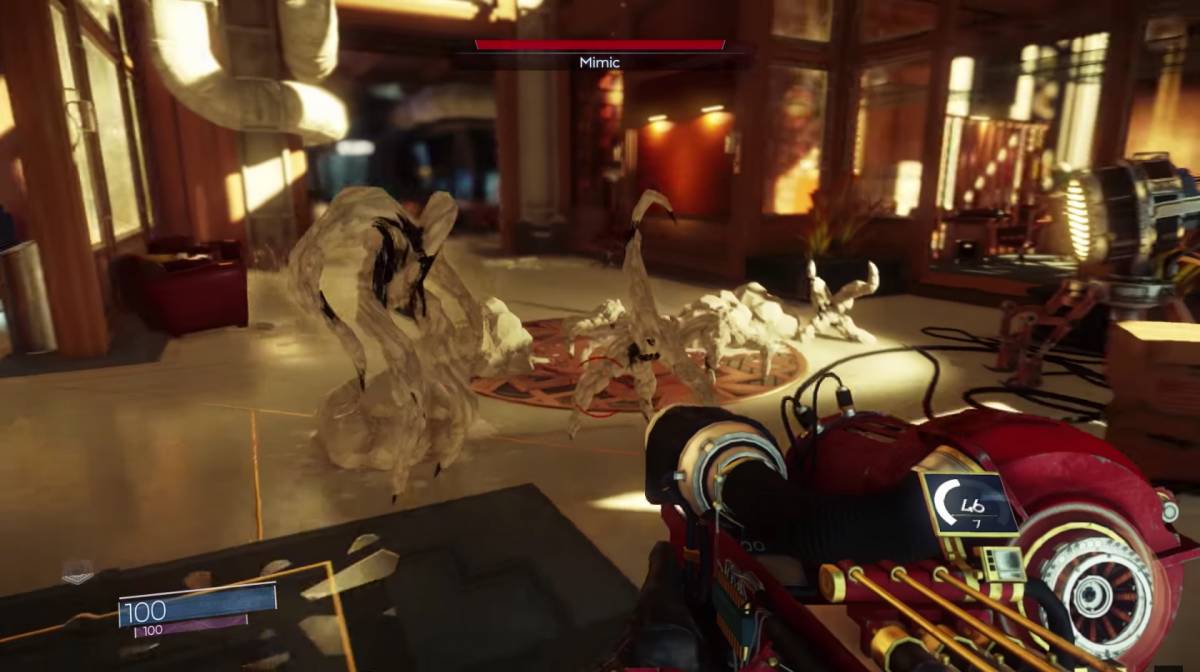
This one I wouldn’t be so worried about if, again, I hadn’t played Dishonored. This has been a point of conflict between myself and others I discuss the game with, and it is a fairly subjective thing, but in Arkane’s flagship series I have always felt as if I’m playing the game “wrong” if I get into a fight. Everything about how Chaos affects the story to how the combat itself controls makes me feel like I’m being punished.
Prey seems to be leaning a little harder on the offensive options so far, with very little in the way of stealth shown beyond it being in service to combat encounters. Given that this points to a more action-oriented game, coupled with the reduction of agency in the player’s overall situation (trapped on a space station with your enemies rather than infiltrating an unsuspecting zone on your terms), it would make sense to not slap the player on the wrist every time they use any number of the cool weapons and inventive powers available.
They seem to be taking the right route with choice and consequence with the inclusion of station security turrets and the Nightmare Typhon. The former are on your side initially and engage anything that reads as Typhon, while the latter is a Nemesis-like enemy that acts as a recurring encounter. As you imbue yourself with more and more Typhon DNA for abilities, the turrets will begin to see you as inhuman, while the Nightmare will have an easier time finding you.
This a much more palatable and interesting route to take than an annoying binary morality system, and I hope it will remain the central conflict surrounding gameplay and character-building decisions. Which leads me to…
4. tough, meaningful character-building choices
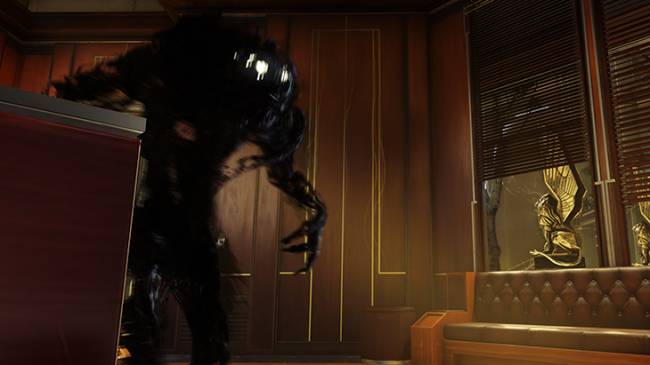
This one is admittedly more of a pipe-dream, and is far from a dealbreaker, but I’d like to see Arkane make it impossible to acquire every ability in one playthrough.
The “RPG-elements” box ticker has been all the rage for most of this decade, and in almost all of them it is extremely easy to gather a vast majority of the abilities and upgrades before you’ve even reached the final boss or level. For systems that are supposed to center around choice, it devalues those choices to then turn around and say “that’s ok, you can just get that later.”
Fallout 4 is perhaps the most recent and egregious example of this, not only making it entirely possible to be a master of all trades but also hiding what should be passive stat upgrades or basic abilities granted at the start behind skill point walls.
I don’t want to have to, for example, waste points leveling up a stat or ability whose sole purpose is to increase the damage of a certain firearm. That should be tied into what ammo or upgrades I put on the gun itself.
The last thing I want to see Prey do is gate off basic gameplay abilities or number bonuses behind skill points. I should be able to navigate the environment, run a decent distance and do damage when my bullets impact from the beginning. Skill points should be an expression of how I want to specialize, not the means through which I make sure my character isn’t a complete invalid in the context of the setting.
The recent Deus Ex titles are a good example of abilities done mostly right; as much as I love the original game, it is much more welcoming that Adam Jensen already comes with a host of basic abilities and proficiency with weapons to expand upon.
The previously mentioned give-and-take with Typhon abilities is an intriguing and welcome design choice, and I can only hope they treat the Human abilities with the same care and meaning.
5. sweet, sweet world-building
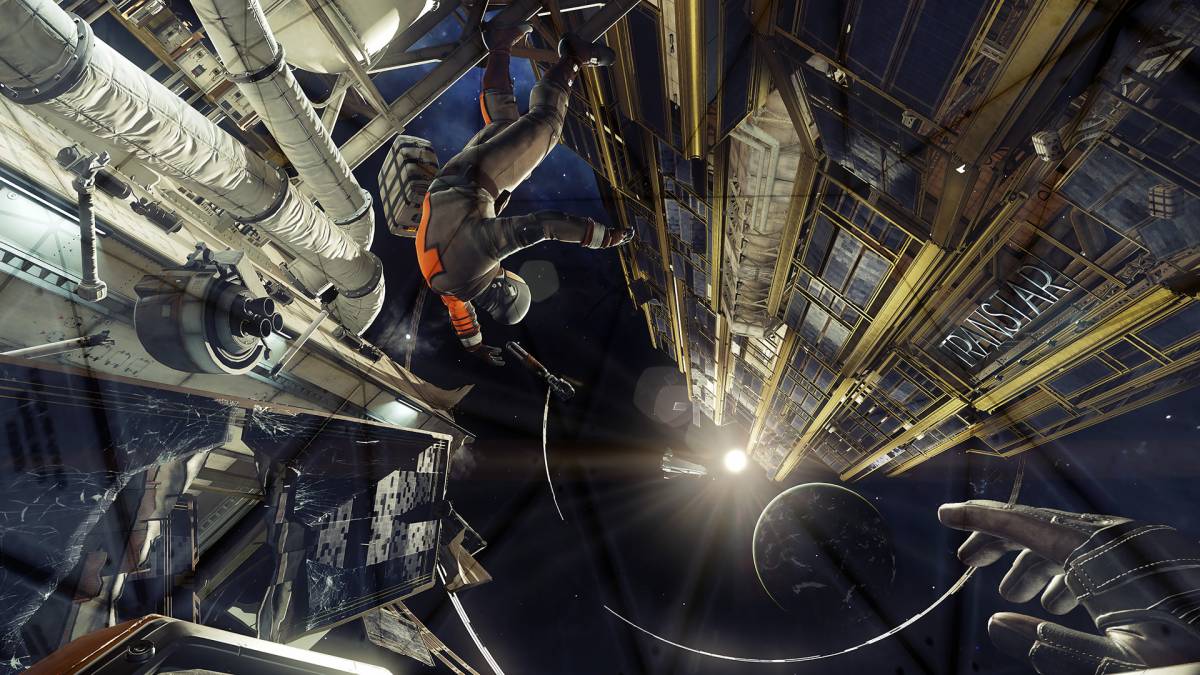
I’ve talked enough about other games in this Prey article, so I’ll conclude by simply saying that I fully expect Arkane to once again deliver a rich world full of beautiful environments, expertly crafted levels and a thick history to comb through while Typhons wait patiently just outside the pause screen for me to finish nerding out.
The choice to do an alternate timeline as opposed to just vaguely setting Prey in the far-flung future is no doubt a conscious one. You don’t resurrect JFK and rewrite the history of the Cold War space race unless you’ve got some cool ideas, and I for one can’t wait to see what comes out of the audio logs, emails and environmental storytelling when Prey launches worldwide on May 5th for PC, PS4 and Xbox One.
Some of the coverage you find on Cultured Vultures contains affiliate links, which provide us with small commissions based on purchases made from visiting our site. We cover gaming news, movie reviews, wrestling and much more.


